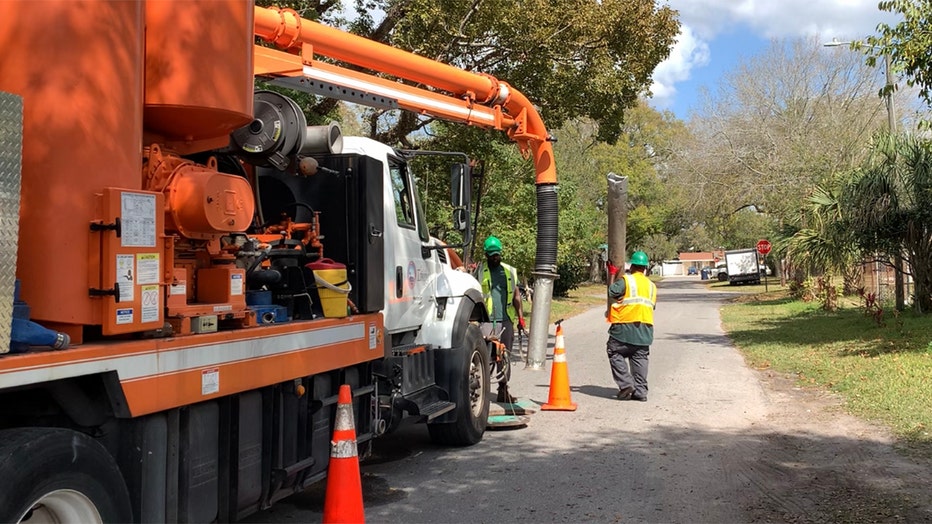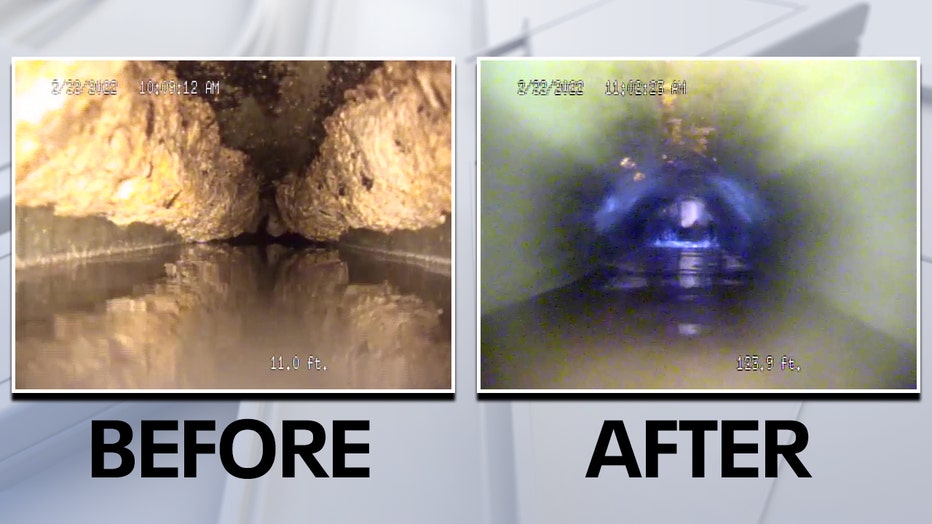Globs of grease, baby wipes form 'fatburg,' cause sewage spills in Tampa
TAMPA, Fla. - The city of Tampa says pouring grease down drains and flushing wipes – even the ‘flushable’ ones – creates so-called fatburgs in the sewer systems and causes sewage to spill out into roadways.
Last Sunday alone, the city reported three wastewater spills where a total of nearly 10,000 gallons of wastewater overflowed from sewers -- all caused by grease blockages.
City officials say residents have to be diligent about what they're putting into the wastewater system.
Sunday's overflows happened in East Tampa and near downtown.
Locations of latest spills
On North 26th Street in the College Hills neighborhood of East Tampa, 1,768 gallons of wastewater overflowed into a retention pond.
Along the Tampa Bypass Canal in the Orient Park neighborhood of East Tampa, 2,295 gallons of wastewater spilled into a stormwater inlet and a ditch that goes into the canal.

And just north of downtown, along the eastern shore of the Hillsborough River near 4009 N Howard Avenue, 5,400 gallons of wastewater flowed into a stormwater inlet that goes to the Hillsborough River.
In all, almost 10,000 gallons of wastewater spilled into neighborhoods and waterways around Tampa.
Where grease goes, and its impacts
The city says the problem is caused by residents who pour grease down their drains and flush baby and makeup wipes down their toilets.
"People cooking in their own homes. When they do that they wash the grease down the sink and the grease sticks to the inside of the sewer pipe, it builds up and blocks portions of the entire pipeline which leads to a wastewater overflow," said Tampa spokesperson Eric Weiss. "It can clog the cities pipes like in this case, and be a danger to the environment."
The spills are especially damaging to marine life in surrounding waterway. Dr. Patrick Schwing with Eckerd College says this can cause bacteria blooms, which suck oxygen out of the water and suffocate fish and other marine life.
"Those can have impacts to things we like to catch and eat – some of the invertebrates like oysters and shrimp, all the way up to some of the fish," Schwing said.
The city says commercial operations typically do not produce the problems because establishments like restaurants are required to dispose of their grease through recycling vendors. The city of Tampa Wastewater Department inspects restaurants and commercial venues to prevent grease from going into the collection system.
After Sunday's spills, the city took water samples and said the results were "within normal levels."
Preventing future ‘fatburgs’
Meanwhile, city officials are encouraging everyone to be careful with what goes down the drain.
Cameras were recently deployed into pipes to show what grease buildup looks like, from the inside. They also recorded video of how pipes look after they've been cleaned.

The ultimate goal is to prevent the buildup, in the first place.
For those at home, the city says grease should be drained into a metal can, cooled, and thrown away. Wipes of all kinds, even the flushable ones, should go in the garbage can.
City officials added that commercial operations have grease traps or grease interceptors that remove grease before it reaches sewers and those establishments are checked regularly for proper grease removal.
A previous version of this story stated one of the spills was in the Marina Club of Tampa neighborhood. It has been corrected to reflect the address on Howard Avenue.

